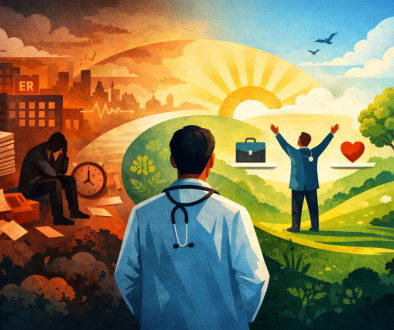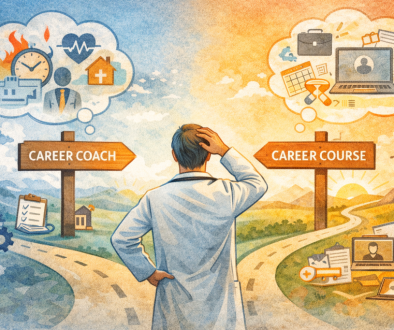Gratitude For Physicians: Rediscover Joy and Resilience in Medicine
“I want you to try something different this week.” I sat in the chair and nodded my head in response. At this point, I’d tried therapy, medications, meditation, exercise, and taking time off. Although all of them had some degree of benefit, if I’m being honest, nothing really significantly changed how I felt. Both my coach and I recognized this. As a result, I was open to whatever the suggestion was.
I was surprised, however, by the next statement. “For the next two weeks, I want you to think of three things you’re grateful for as you walk into the hospital.” I’m sure the expression on my face was not that subtle. My first thought was, “This is a bunch of BS.” I’m exhausted, not sleeping, considering quitting medicine, and I’m being asked to think of three things I’m grateful for as I walk into a job that I’m unhappy in.
I paused for a second, took a deep breath, and said, “Okay, I’ll try it.” In my head, I thought, “I’ve got nothing to lose.”
The Science Behind Gratitude
Gratitude, the practice of acknowledging and appreciating the good things in life, has been the subject of numerous studies. Research has shown that regularly practicing gratitude can lead to increased happiness, improved relationships, better sleep, and even a stronger immune system. For physicians, who often face high levels of stress and burnout, cultivating gratitude can be a powerful tool for maintaining well-being and resilience.
How Gratitude Benefits Physicians
As physicians, we are constantly exposed to challenging situations, long hours, and emotionally draining cases. It’s easy to get caught up in the negative aspects of our work and forget the reasons we chose this profession in the first place. By practicing gratitude, we can shift our focus to the positive, even in the face of adversity. This shift in perspective can lead to:
- Increased job satisfaction: Acknowledging the meaningful moments and positive impact we have on our patients’ lives can remind us of the value of our work.
- Improved patient interactions: When we approach our patients with a grateful mindset, we are more likely to be present, compassionate, and empathetic.
- Enhanced resilience: Gratitude can help us bounce back from setbacks and challenges, as we learn to appreciate the lessons and growth opportunities in difficult situations.
- Stronger connections with colleagues: Expressing gratitude towards our coworkers can foster a more positive and supportive work environment.
Gratitude Exercises for Physicians
Incorporating gratitude into your daily routine doesn’t have to be time-consuming or complicated. Here are a few simple exercises to get you started:
- Gratitude journal: Take a few minutes each day to write down three things you’re grateful for. They can be big or small, work-related or personal.
- Gratitude walk: As you walk into the hospital or clinic, think of three things you’re grateful for. This can help set a positive tone for your day.
- Gratitude letters: Write a letter expressing your appreciation for a colleague, mentor, or patient who has made a positive impact on your life. You don’t necessarily need to send the letter; the act of writing it can be powerful on its own.
- Gratitude meditation: Take a few minutes to sit quietly and reflect on the things you’re grateful for. Focus on the feelings of appreciation and allow them to fill your mind and body.
The Limitations of Gratitude for Physicians
It’s important to acknowledge that practicing gratitude will not change the challenging circumstances we face as physicians working in the modern healthcare system. However, it can change the way we think about, feel about, and respond to those circumstances. By shifting our focus to the positive, we can find greater joy, meaning, and fulfillment in our work.
Grateful Physicians
So, for the next couple of weeks, as I walked into work, I thought of a couple of things that I was grateful for. And at first, nothing happened. But then I noticed things started shifting. First, my approach to problems was slightly different. The inner voice that said, “This is horrible, I don’t want to be here,” was a little bit quieter. And the old voice that I hadn’t heard for a long time that said, “Let’s figure this out, you can do this,” was back. Second, I noticed I was greeting people in the hallway more.Previously, when stress overwhelmed me as I rushed between tasks, trying to get from one thing to another, I would quickly walk through the hallway with my head down.
So, I kept up the practice. If I’m being honest, that small ask of thinking of one thing that I’m grateful for was the beginning of change for me. It didn’t happen overnight. The challenges of being a physician did not disappear. It did, however, rediscover the joy and meaning in my work as a result. And for that, I am truly grateful.
Give it a try! You might be surprised at the difference it can make.





